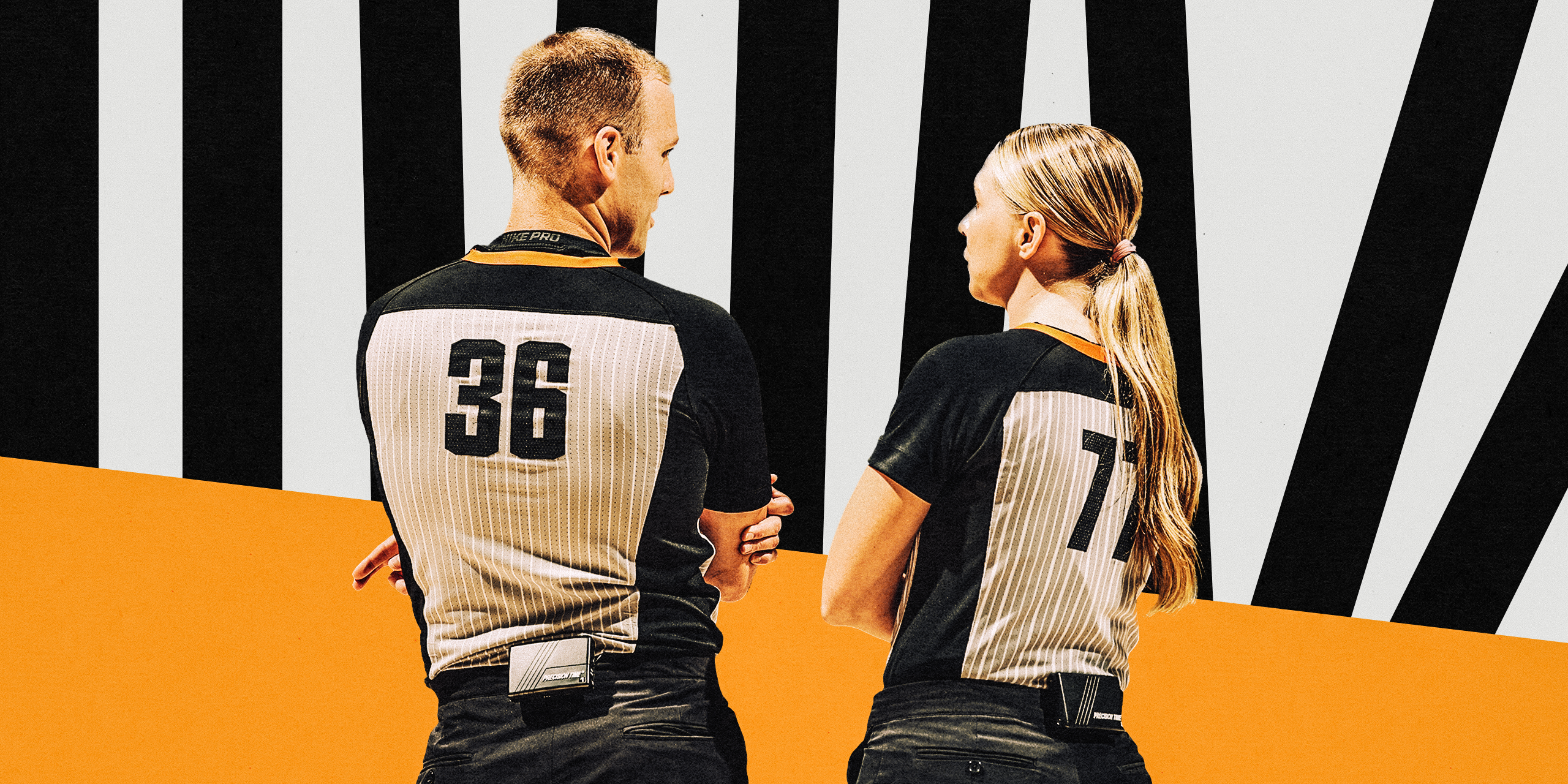Sports
Does the WNBA have an officiating problem? Coaches cite high turnover, inconsistency – The Athletic

WNBA
The Athletic has live coverage of the WNBA Finals Game 2 featuring the New York Liberty vs. Las Vegas Aces
LAS VEGAS — Jonquel Jones knew she didn’t want to fully answer the question that had just been posed to her. Sitting on the postgame media dais after the New York Liberty’s loss to the Las Vegas Aces in Game 1 of the WNBA Finals, she was asked about what a reporter deemed a “quick whistle” during the contest.
Advertisement
Jones, who recorded her seventh consecutive playoff double-double, smiled and replied, “I already got one fine this playoffs, I’m not getting another one.”
She reserved any public judgments about Sunday’s officials. It was a significant change from the semifinals, when during an in-game interview with ESPN, she looked directly at the television camera and said: “They want the players to be better, the refs got to be better at the end of the day. … They want us to be better; be better, refs.”
Jones is not alone voicing frustration about the WNBA’s officiating this season. Among other recent complaints, Connecticut Sun guard Natisha Hiedeman recently tweeted that she had been fined for post-semifinals comments. She wrote on social media: “refs have been terrible from both sides…not even in the series but the whole season.” Of course, complaints about officials aren’t uncommon in sports. Scan any league during any season, and one is bound to find similar gripes.
“I think there’s always going to be a very healthy, normal tension between teams and officials,” says Sue Blauch, the head of WNBA referee performance and development and a former WNBA referee of 20 seasons.
Still, as this year’s WNBA Finals resume Wednesday when the Aces and Liberty tip off in Game 2, some of the frustrations voiced by teams seem as loud as they’ve ever been.
Now that we don’t got no more checks coming in the refs have been terrible from both sides…not even in this series but the whole season. Ppl gon get hurt. I hope for the finals it can just be FAIR!!
— T-SPOON (@NatishaHiedeman) October 2, 2023
Over the last two months, The Athletic has discussed WNBA officiating with three general managers, three head coaches and two assistants. Each was granted anonymity to allow for an honest conversation without them risking fines for publicly criticizing officiating.
Advertisement
“I believe our officiating was the worst this year than it had been in 15 years,” a WNBA general manager says.
A head coach says what many echoed: “It’s not necessarily worse, but I would say inconsistent. It’s just not as consistent as it needs to be when the product is as good as it is.”
Blauch pushed back on that accusation and says despite some year-to-year variation, the league’s officiating performance has remained consistent through the last five years. Monty McCutchen, who had worked more than 20 years as an NBA referee, is the NBA senior vice president and head of referee development and training. He and Bluach declined to share specific performance numbers or publicly discuss their evaluation methods.
However, similar to the NBA’s practice, an independent set of NBA-hired game reviewers evaluate every WNBA contest and grade every call and non-call, Blauch and McCutchen say. They say that WNBA, NBA, NBA G League and Basketball Africa League officials are trained with the same set of expectations and standards.
“There’s an ecosystem that is based on one standard, and that hasn’t always been the case, and I think it’s improved officiating across the board,” McCutchen says. “I am very confident that the WNBA has the top officials.”
Many working with WNBA teams aren’t convinced. Several point to a high yearly turnover rate of multiple WNBA officials moving out of the league and into the NBA. The announcement of four officials with WNBA experience joining the NBA was even referred to as a promotion in a 2022 NBA news release, with the word “promotes” being used in every release from 2018 to 2022. Some in the WNBA argue the turnover leaves their league without the best and most experienced officials.
“(Referees) are good and they have a lot of promise, and then they get taken from us,” a second general manager says.
Advertisement
More than 20 NBA officials have WNBA experience, and multiple WNBA executives noted that historically officials with NBA experience rarely go on and work as WNBA officials.
“I think, unfortunately, the NBA is the end goal for a lot of these officials,” a WNBA general manager says.
Adds another GM: “Do we pay them more? What do we do? How do we stop them (from leaving)? … The question is how do we keep the best officials in the WNBA?”
McCutcheon pushes back on the concept of the WNBA being a perceived feeder league for the NBA, saying moving from the G League to the W or NBA is considered a promotion but moves between the WNBA and NBA would be lateral.
Turnover is common, however. Blauch says the WNBA had seven new officials this season. She notes that of the WNBA’s roster of over 30 referees, a little more than half have at least five years of experience in the WNBA, with some officials, like Eric Brewton and Roy Gulbeyan, having worked more than two decades in the league. She acknowledges there’s some newness to the league’s current roster, but over time she expects coaches and players to develop more rapport with newer referees and “soften some of those preconceived ideas.”
Nevertheless, some coaches worry if those new officials excel, they’ll be moved to the NBA, too, where they’ll call more games and earn a higher salary. Officials frequently changing presents a number of issues, coaches say.
“I think there are some (officials) that are trying to have those conversations (with coaches in games), but as a whole, I don’t think it’s enough,” one head coach says. The coach says some of the more veteran referees are calmer because of their experience and professional relationship with coaches.
The lack of experience can lead to inconsistent calls, one says.
“With more experience, you get more feel,” the coach says. “We’re not saying perfection, we’re just saying consistency. They could be fine and then for a pocket they’re inconsistent, and that’s the game.”
Advertisement
Throughout the season, public criticism of officials hasn’t just come after losses. Ten technical fouls — the most ever in a WNBA regular-season contest — were called in a June game between the Atlanta Dream and Dallas Wings. Despite winning, Wings coach Latricia Trammell was stunned.
“I definitely have never seen anything like it,” she said.
Following a July win over the Washington Mystics, Minnesota Lynx coach Cheryl Reeve took issue with the enforcement of a key foul even though it benefited her team. “(That) was not a take-foul,” she said after the game. She said she understood why Mystics coach Eric Thibault, who according to Across the Timeline led the WNBA in technical fouls, was frustrated by the officiating, which rewarded the Lynx with a 23-4 free-throw attempt advantage.
Even after tying a WNBA record for points in a single game, two-time WNBA MVP A’ja Wilson said she was “shocked” by a late foul call that put her at the line for her final pair of free throws.
“I don’t normally get those calls,” she said, making a point more about the referees’ inconsistency than the call itself.
In moments of disagreement, coaches and team executives routinely submit plays for Blauch and the league office to review. After games, coaches are asked to fill out feedback surveys, in which they are instructed to rate officials’ on-court communication skills and game awareness, among other categories. Blauch says these are helpful in determining and solving repeated criticisms. Some coaches, however, say filling it out isn’t worthwhile.
“It doesn’t change anything,” one head coach says. “It doesn’t make anything any different in the game, so sometimes I do it, sometimes I don’t.”
McCutchen says officials also receive regular feedback from the league’s internal Referee Engagement Performance System. Like in the NBA, the platform is used by McCutchen and his team to increase referee improvement and release playlists regarding topics like flagrant fouls, traveling and transition take fouls.
Advertisement
The latter rule was modified last offseason and now receives a higher penalty, with the offensive team being awarded a free throw and retention of the basketball. The addition of challenges has been another change for this season, though its implementation has received mixed reviews.
In The Athletic’s recent anonymous general manager survey, five of the nine general managers who responded hoped to see changes either with the league’s challenge rule or official review protocols. One, who struggled to separate the two from each other, said the broad hope is to help foster accuracy with officials’ late-game calls, and multiple wanted more challenges per game. Some coaches, who also hope to see a second challenge added in future seasons, do so not wanting to use their single challenge on a call they deem “obvious” yet enforced incorrectly.
Multiple team sources interviewed for this story additionally point to added transparency around late-game calls as another mechanism they believe would improve officiating. Since March 2015, the NBA has issued public assessments of officiating when contests are within three points at any moment in the final two minutes of regulation or overtime. The NBA’s website says the Last Two Minute Reports are part of the league’s “ongoing effort to build a great awareness and understanding of the rules and processes that govern our game. Additionally, it serves as a mechanism of accountability to our fans and the media who seek clarifications after our games.”
Such mechanisms don’t exist in the WNBA, however. McCutchen says the league is open to adding these, but there hasn’t been a need for a lot of individual news releases about missed calls, and therefore there hasn’t been as big of a clamoring from league stakeholders, at least not enough of an outcry to “throw financial and time resources” at the effort.
He stresses that the NBA and WNBA “never run from the fact that we make mistakes.” He cites the overall high standard of the group.
“We expect a level of excellence out of officials,” McCutchen says. “Not perfection. Excellence.”
Yet team personnel still hope to see future improvement in officiating.
“I don’t want to say screw it,” an assistant coach says, “because it’s too important.”
(Illustration: John Bradford / The Athletic; photo: David Sherman / NBAE via Getty Images)
Subscribe to The Athletic for in-depth coverage of your favorite players, teams, leagues and clubs. Try a week on us.
Ben Pickman is a staff writer for The Athletic covering the WNBA and women’s college basketball. Previously, he was a writer at Sports Illustrated where he primarily covered women’s basketball and the NBA. He has also worked at CNN Sports and the Wisconsin Center for Journalism Ethics. Follow Ben on Twitter @benpickman









